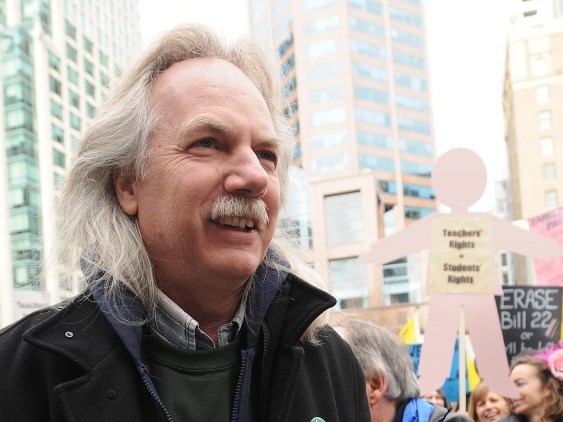The B.C. Teachers’ Federation will hold a strike vote March 4 to 6, with results to be announced on the evening of March 6.
BCTF president Jim Iker told reporters Tuesday morning “it’s very, very likely” the vote will pass.
Iker said the teachers’ federation opted to put pressure on the government with a strike vote after a year of bargaining and more than 40 sessions at the table to push back against unreasonable offers.
Iker said the B.C. Public School Employers’ Association tabled language that again would strip provisions on class size, class composition and staffing levels for teacher-librarians, counsellors, special education and other specialist teachers.
The government has offered a 0.5 per cent increase on the date of ratification that’s not retroactive. The government’s contract with teachers expired last June, so Iker said this means teachers received no pay increase in 2013-2014, would receive no increase for 2014-2015, with various 1 per cent and 0.5 per cent increased over the following four years.
He said Premier Christy Clark has told the public the province wants a 10-year deal with teachers but the BCTF sees a different story behind closed doors.
“Since the fall, Christy Clark’s government, through their appointed leaders at BCPSEA, is again trying to strip teachers’ working conditions and freeze wages,” Iker said. “They propose nothing that teachers can agree to, not a single incentive for any deal, never mind a longer term deal.”
The vote coincides with the BCTF’s return to the bargaining table with the provincial government. Negotiations are scheduled for March 4 to 7, 11 and 12.
Vancouver School Board chairperson Patti Bacchus says she wasn’t surprised to learn about the strike vote.
“I had actually seen a summary of what government was offering and I knew that was not going to be successful as a starting point,” she said.
Bacchus hopes the parties will reach an agreement at the table that will provide stability and first-rate learning conditions for students.
“Certainly, we have been very clear that whatever is ultimately the outcome of bargaining is it must be funded fully by government,” she said.
The district has struggled to fund wage increases previously negotiated between teachers and the government.
“I know government has been quite adamant about a 10-year deal, I think they need to focus on getting a deal that’s going to work for both sides and not let that be a barrier to successful bargaining,” she said.
Once a strike vote is taken, a union has 90 days to activate it with job action. Iker says no matter what happens, the BCTF will continue to negotiate at the table.
Any job action would happen in stages. Iker initial action would not include immediate school closures or interruptions for students, teachers halting participation in extracurricular activities or disruption with report cards or communications with parents.
twitter.com/Cheryl_Rossi



